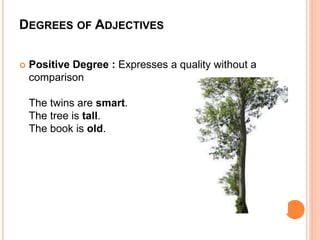Adjectives
- 1. ADJECTIVE
- 2.  Adjectives are descriptive words. They usually answer which? what kind of? How many questions. They describe the noun is being talked about. The little boy A new toy
- 6. DEGREES OF ADJECTIVES  Positive Degree : Expresses a quality without a comparison The twins are smart. The tree is tall. The book is old.
- 7. COMPARATIVE DEGREE : USED TO COMPARE THINGS TO EACH OTHER. Form Use Example er Shorter adjectives (1 syllable or 2) hotter area, warmer water more longer adjectives (2 or more syllables) more interesting subject, more comfortable couch more adjectives that end withed , ing , 's' (even if they are 1 syllable) I am more tired , more boring book
- 8.  Fred is taller than Barney. Barney is smarter than Fred. .
- 9.  Superlative Degree : Superlative is the highest or the lowest degree when comparing two or more things/persons. The inflectional suffix for superlative degree is est. Longer superlatives usually take most instead of est. This is the brightest room in the house. Duncan is the tallest player on the team. Britney is the most beautiful girl in the class.
- 10. TASKS
- 11. 11
- 14. USE THE ADJECTIVES IN EITHER THE COMPARATIVE OR THE SUPERLATIVE FORM late young young cheap fast hard tall exciting long old 1. The movie lasted ---- it was expected. 2. I find detective stories ---- than any other ones. 3. Steve was much ---- any of his classmates. 4. Although she looks younger, she is ---- of the two. 5. We could barely catch ---- train to London.















